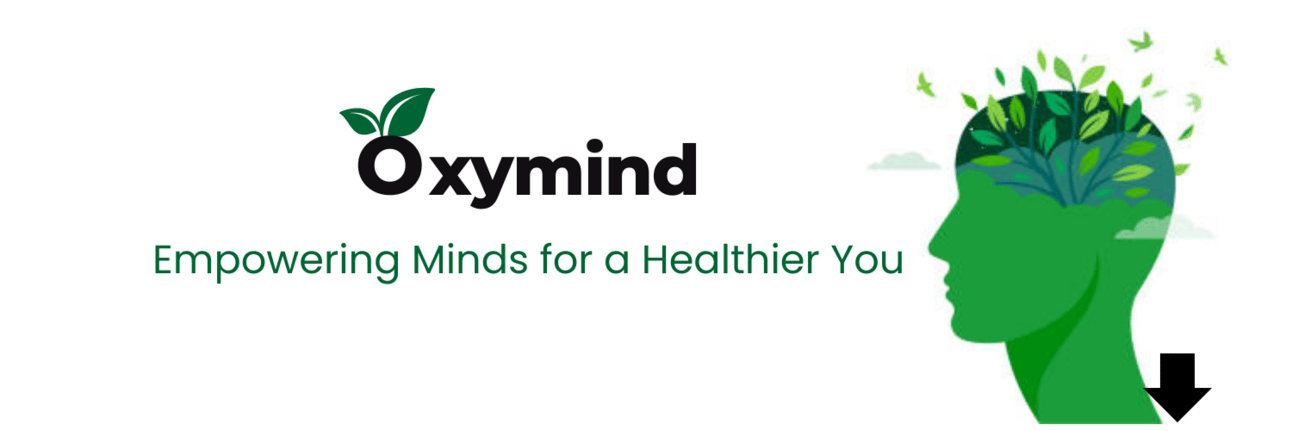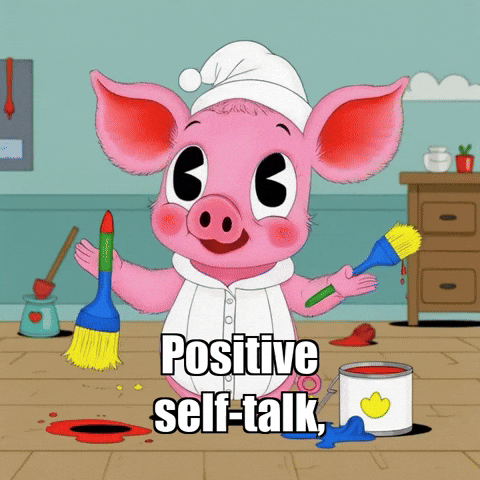- The Oxymind
- Posts
- The Power of Positive Self-Talk
The Power of Positive Self-Talk
The Simple Daily Practice That Turned My Inner Critic Into My Greatest Ally

In Partnership With
In the mail today….
Positive Self-Talk
Quick Tip: Combine Tasks to Create Flow
Productivity Hack: The "Tomorrow's Teammate" Technique
Product Recs
The Science Behind Self-Talk
I used to think the constant chatter in my head was just background noise I had to live with. Then I learned that we have approximately 60,000 thoughts every day, and research shows that up to 80% of these thoughts are negative or repetitive.
This internal dialogue—what psychologists call "self-talk"—wasn't just noise. It was actively shaping my reality.
Dr. Ethan Kross, a leading researcher in this field, has demonstrated through neuroimaging studies that the way we talk to ourselves literally changes our brain activity. When we engage in negative self-talk, we activate the same brain regions associated with physical pain. Conversely, positive self-talk activates areas linked to self-control and emotional regulation.

My Story: Finding Peace in My Own Words
A couple of years ago, I was my own worst critic. I’d walk into a meeting second-guessing every word I planned to say, convinced I’d fumble. At night, my mind would replay every awkward moment, fueling anxiety that kept me awake. I felt small, like I was never quite measuring up. Then I picked up The Power of Your Subconscious Mind by Joseph Murphy, and it was a wake-up call.
Murphy wrote, “Change your thoughts, and you change your destiny.” It made me realize my harsh self-talk was shaping how I felt and acted. I decided to try something new. When I caught myself thinking, “I’m going to fail at this,” I’d pause and reframe it: “I’m learning, and I’ll get better with practice.”
At first, it felt forced, like I was faking it. But I kept at it, jotting down affirmations like, “I am capable and worthy,” and saying them in the mirror each morning.
Slowly, I noticed a shift. My heart didn’t race as much before big moments. I started speaking up in group settings without overthinking. Even when things went wrong, I could shrug it off instead of spiraling. That negative voice? It’s still there sometimes, but it’s quieter now, and I’m stronger for it.
How Negative Self-Talk Fuels Anxiety

Anxiety often begins with a simple "what if" thought that spirals into catastrophic thinking. Consider Sarah, who thinks: "I made a mistake in that presentation. Everyone probably thinks I'm incompetent. I'll never get promoted. Maybe I'm not cut out for this job." This cascade of negative self-talk transforms a minor error into an existential crisis.
Negative self-talk patterns that feed anxiety include:
Catastrophizing: Imagining the worst possible outcomes
All-or-nothing thinking: Viewing situations in extremes
Mind reading: Assuming you know what others think about you
Fortune telling: Predicting negative future events without evidence
These patterns create a feedback loop where anxious thoughts generate more anxiety, making it harder to think clearly and respond rationally to challenges.
Building Mental Strength Through Positive Self-Talk
Mental strength isn't about being perpetually optimistic—it's about developing resilience, emotional regulation, and the ability to bounce back from setbacks. Positive self-talk serves as a cornerstone of mental strength by:

Creating emotional distance: When you talk to yourself in the third person ("Sarah can handle this challenge"), you create psychological distance that reduces emotional reactivity and improves problem-solving abilities.
Enhancing performance: Athletes have long used positive self-talk to improve performance. The same principles apply to daily life challenges, from public speaking to difficult conversations.
Building resilience: Positive self-talk helps reframe setbacks as learning opportunities rather than personal failures, crucial for bouncing back from adversity.
Practical Strategies for Transforming Your Inner Voice
1. Awareness and Interruption
The first step is becoming aware of your negative self-talk patterns. Try the "STOP" technique:
Stop what you're doing
Take a breath
Observe your thoughts
Proceed with intention
2. The Best Friend Test
Ask yourself: "Would I talk to my best friend this way?" If not, why is it acceptable to treat yourself with less kindness? This simple question can immediately shift your perspective.
3. Evidence-Based Thinking
Challenge negative thoughts with evidence. Instead of "I always mess things up," ask: "What evidence do I have for this? What evidence contradicts it? What would a balanced perspective look like?"
4. Reframing Techniques
Transform harsh criticism into constructive feedback:
Instead of: "I'm so stupid for making that mistake"
Try: "I made an error, and I can learn from this experience"
5. Power Phrases
Develop a toolkit of positive affirmations that resonate with you:
"I am capable of handling whatever comes my way"
"Mistakes are opportunities for growth"
"I choose progress over perfection"
"I am worthy of kindness, especially from myself"
Your Brain Can Actually Change
Here's what motivated me to stick with this: our brains can literally rewire themselves through consistent positive self-talk. In just eight weeks, studies show measurable changes in brain areas that control emotional regulation and stress response. I wasn't denying real challenges—I was training my brain to default to balanced thinking instead of catastrophizing.
My 8-Week Transformation Plan
Weeks 1-2: Kept a thought journal and identified my harshest self-talk patterns Weeks 3-4: Used the "best friend test" and evidence-based thinking daily
Weeks 5-6: Created personal power phrases and celebrated small wins Weeks 7-8: Found an accountability partner and tracked my progress
Quick Tip: Combine Tasks to Create Flow
If your day is packed, consider task pairing—combining two activities that complement each other.
Examples:
Work calls + Outdoor Walk: Get some fresh air and mental clarity while handling routine calls.
Podcast or Audiobook + Commute: Turn commuting time into a chance for learning and self-development.
Meal Prep + Family Time: Get the family involved in meal prep, blending quality time with a productive task.
Task pairing allows you to manage both worlds more fluidly, increasing satisfaction and reducing stress.
Productivity Hack

The "Tomorrow's Teammate" Technique
At the end of each workday, leave yourself an encouraging note for tomorrow: "You tackled some challenging tasks today. Tomorrow you'll continue this great momentum on it." This primes your brain for a positive start.
Why This Works: Your morning mindset is often shaped by how you ended the previous day. When you leave yourself a supportive message, you're essentially becoming your own best teammate. Instead of waking up to a critical inner voice listing everything you didn't accomplish, you're greeted by encouragement and clear direction.
How I Do It: I keep a small notepad on my desk and spend 2 minutes before leaving work writing tomorrow's note. It includes three elements:
Acknowledgment: "You handled that difficult client call really well today"
Momentum: "You're building great progress on the quarterly report"
Gentle guidance: "Tomorrow, start with 30 minutes on the budget analysis—you've got this"
The Psychology Behind It: Research shows that how we end one experience significantly impacts how we begin the next. By consciously crafting a positive transition message, you're interrupting the cycle of overnight worry and morning dread that can kill productivity before the day even starts.
Pro Tip: On particularly challenging days, I write the note as if I'm encouraging my best friend: "Tomorrow is a fresh start. You're capable and resilient, and you don't have to be perfect—just present."
Product Recs
Genius Wave: A neuroscience-based device that uses sound waves to promote relaxation and mental clarity, aiding healing. |
Mindfulness: Everyday guided practice and meditation to help you deal with anxiety and overwhelming stress. |
online-therapy.com: Life-changing therapy & tools for a new you. |
Everyday Yoga: Whether you're just starting out or you're a seasoned yogi, you're covered. They pride in being the go-to destination for yogis, and offer a diverse range of top-of-the-line products from your most beloved brands. |
Have you enjoyed reading this newsletter? Here's another one you don't want to miss!
MaxDividends: High Yield & Dividend Growth Stocks worth Investing In to Boost Your Passive Income for Living Off Dividends and Retire Early. 25,000+ constant readers!
Female Startup Club: Your smart founder friend that gives you the best insider tips to start or grow your biz. Join 19,000 women who love our weekly content 💸
The Wealth Wagon: Your go to newsletter for finding all of the best ways to generate passive income and building wealth. Subscribe to find out how you can grow wealth.
6AM City - AVLtoday: Daily email 📩 delivering the most relevant, need-to-know news and events for Asheville, NC📍 Brand Safe: No politics or divisive topics. A marketing engine for our cities.
What I Want You to Know
Your inner voice will be with you for your entire life—I learned to make mine an ally, not an adversary. The conversation you have with yourself shapes the life you create, and you have more control over that conversation than you might think.
Start small, be consistent, and trust the process. If someone like me—who spent years as my own worst critic—can transform their inner dialogue, I truly believe you can too.
What will your inner voice say to you today? I hope it's something kind.
Talk soon
Bolaji
The OxyMind
Next week, I'll be sharing a new scientific discovery for longevity. Until then, be gentle with yourself and remember—you're doing better than you think.


